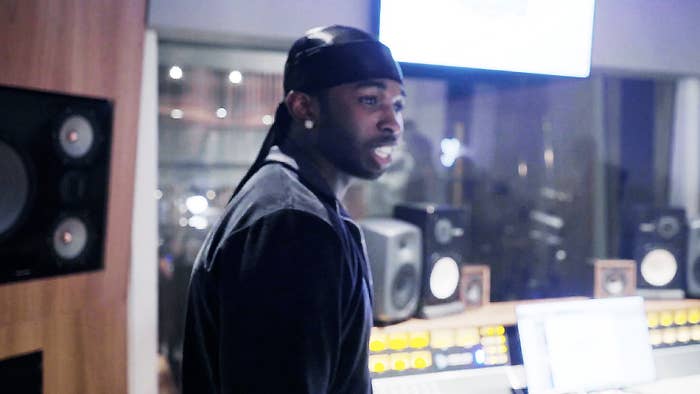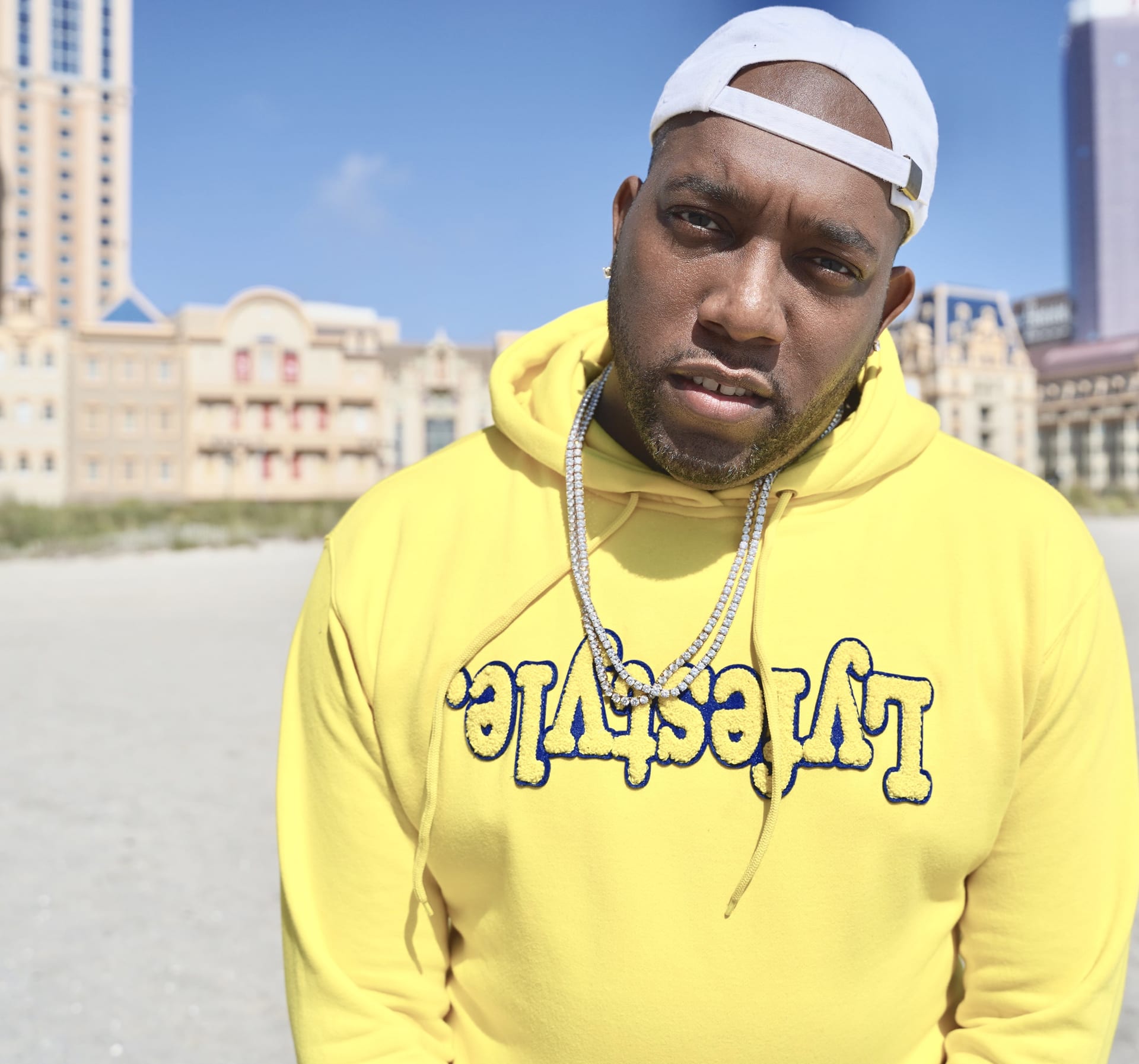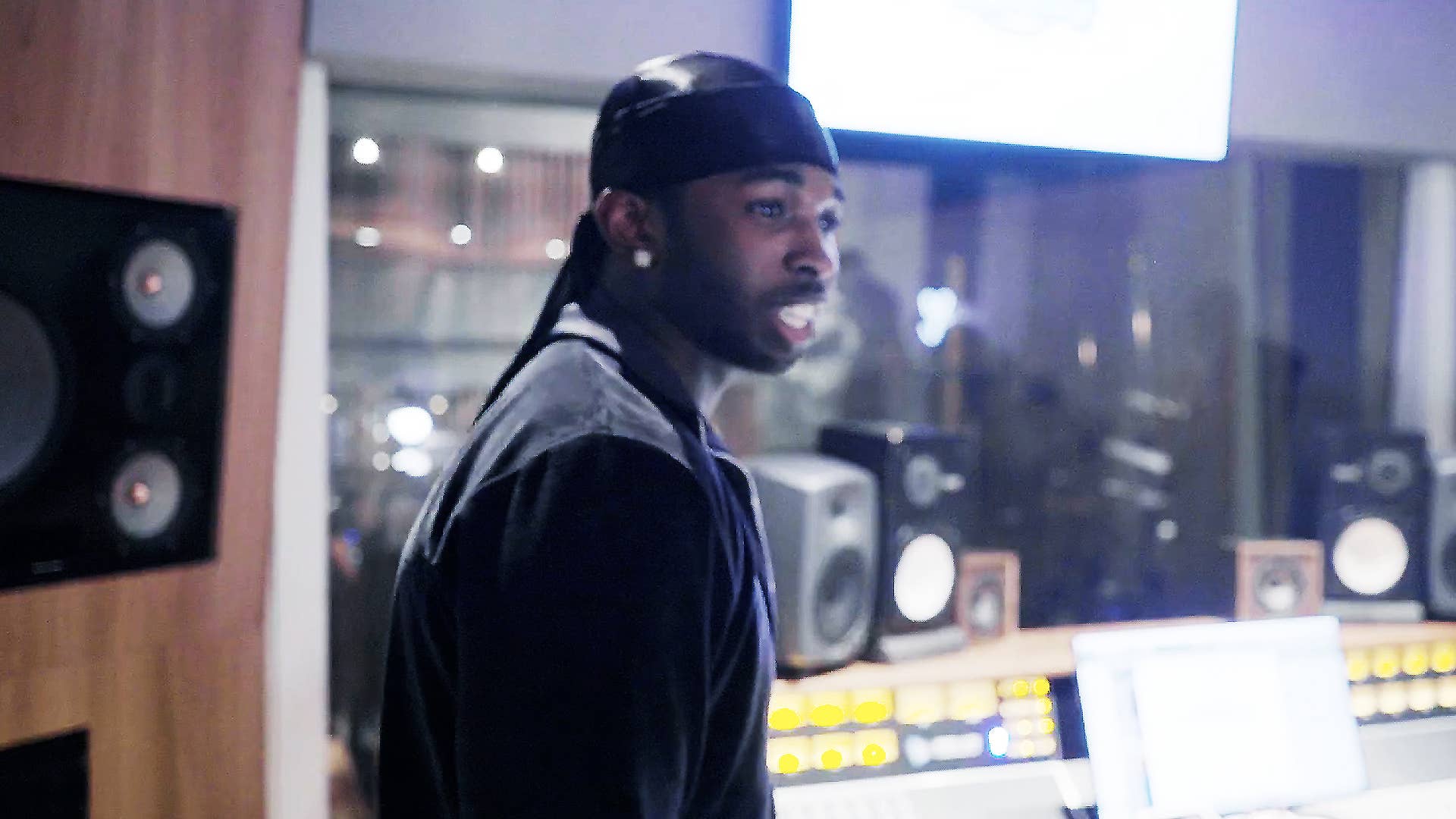
When DJ and media personality Pvnch was approached with the opportunity to host Complex and Spotify’s new podcast series, Complex Subject: Pop Smoke, he knew it was a perfect fit.
Not only did he have years of experience interviewing A-list New York rappers with 50 Cent’s ThisIs50 outlet, he had a personal connection with Pop Smoke. The two came from the same area in Canarsie, Brooklyn, and Pvnch had been following Pop’s journey for years—from the neighborhood basketball courts to major rap stardom. The two had also been in talks about setting up an interview, but unfortunately, Pop Smoke’s life was cut short in February 2020.
“I don’t feel like there was anybody else who could have done it, who has the level of media experience that I have and is on the ground level with me,” Pvnch says, talking about why he was the right person for the job of hosting Complex Subject. “Of course, there’s a bunch of people that were even closer to Pop than I was, but they might not be able to articulate it in the right manner to really understand the scope of how impactful he truly was to the culture and what he represented.”
On July 20, Complex Networks and Spotify premiered its six-episode series Complex Subject: Pop Smoke. The podcast, hosted by Pvnch, was released on what would have been Pop’s 22nd birthday. The series focuses on Pop Smoke’s public life and legacy, but Pvnch notes it includes a handful of gems about what the Brooklyn rapper was like away from the cameras and social media.
“It divulges a side of Pop that the world did not get to see,” he explains. “The world got to see the street guy who loves to rap, and we got to see the guy who also likes high fashion, dancing, and the fun life. But I don’t think people really got to see how funny Pop was outside of the aggression.”
Celebrating the release of Complex Subject: Pop Smoke (you can binge all six episodes on Spotify now) Pvnch took some time out to discuss his relationship with Pop Smoke, what he learned from the podcast, and how he views the late rapper’s impact on Canarsie and the music industry at large. The interview, lightly edited for clarity, is below.

When did you first meet Pop Smoke?
It was probably around February or March of 2019 when he was already Pop Smoke. But I had seen him in and out of the town, just from playing ball and shit like that.
What do you remember about Pop during those days?
I’m older than him, so it seemed very fresh, almost like rookie shit. I think “rookie” might have a negative connotation to it—so it was rather wide-eyed. He was very excited for it all to happen, and very confident. He understood, he believed, and he knew what he wanted to do.
How involved were you with his career back then?
By that point, I already had a clear representation of my brand to the culture. If you’re coming out of New York, specifically Brooklyn, and Pvnch stands by you, it looks really good. If you look at my trajectory, I first went around Bobby [Shmurda], then Desiigner and Young M.A. I’ve also stood by Casanova, Cardi B, and then Tekashi. So it’s like, when Pvnch stands by you, for lack of a better explanation, you can conceptualize it. When Pop and I finally met, he’s like “Yo, I need to do an interview before my birthday.” And it’s so crazy because that was April we were talking about it. The reality is that you never know when someone’s going to go. I have the text message from him and everything. Then he took off around June.
“When you’re listening to this podcast, you’re finally getting to peel back the layers of who Pop truly was.”
How would you describe the Complex Subject: Pop Smoke podcast to people who haven’t heard it?
I think it divulges a side of Pop that the world did not get to see. Social media is very transparent, but it’s so difficult to view what’s real and what’s not on social media, because everybody posts what they want. I think that Pop was able to post two dimensions of his true personality. The world got to see the street guy who loves to rap, and we got to see the guy who also likes high fashion, dancing, and the fun life. But I don’t think people really got to see how funny Pop was outside of the aggression. He could just chill out and laugh and joke. And then there’s this other side that I got to see that I don’t know if everybody around him got to understand.
I remember Pop called me when he went to South Beach, Florida. I just remember being like, “Wait, what are you saying?” He said, “Yo bro, I never even been on a plane.” And I just said “holy shit” at that point. It had become such a comfort to me to travel that I [forgot] that a lot of my young peers from my town have never done that. South Beach was just the beginning for him. Of course, he later ended up getting to see London and Europe and shit like that. But at the beginning it was like, “Yo, I’m here,” and those were the moments I’ll refer back to.
What made you want to host the series?
I don’t feel like there was anybody else who could have done it who has the level of media experience that I have and is on the ground level with me. Of course, there’s a bunch of people that were even closer to Pop than I was, but they might not be able to articulate it in the right manner to really understand the scope of how impactful he truly was to the culture and what he represented. I just felt like Complex was a perfect bridge to meet at.
And then being from Canarsie… I want to say it with humility, because everybody gets so testy, but I’ll say this: I am one of the most notable people from the town. Before Pop, I might have been the most notable from the town, without anybody getting into their emotions. So on that scale, I’m the face of the town. Especially from a media standpoint, or a DJ standpoint, there’s nobody that would have made more sense to do it. It would have been fantastic if we’d had the interview. It would have made the most sense, but what happened with Pop at that point, it was happening in fast-forward for him. And I truly understand that because I relate that back to when everything was happening for me in fast-forward.
Is there anything from the podcast that might surprise people about Pop Smoke or his journey?
I think the biggest surprise to everyone was just that he’s really a fun-spirited person. I’ll give you an example. Pop being active, you always have to swell your chest and always be on point, always be aggressive. That’s the bravado that you almost have to put out at all times. So when you see the young aggressive kid laugh, it’s almost like “Oh, you niggas have fun, too.” There’s this high level of pressure to behave, interact, and be on. And there’s this other side where there are people who want to harm us just because of what neighborhood we’re from. So, you’re forced to be tough.
When I saw him at Nappy Blue’s house for a little bit, he gave me “Dior” before “Dior” came out. I wanted to leak it. We’re on video, and he wants to put it out, too. He was actually going to call it “Dior Amiri.” A lot of people don’t know that. And I remember I said, “Yo, bro, why would you call it the trendy designer right now? That shit’s probably not even going to last.” And he’s like, “Nah, bro, you don’t know.” Two years later Michael Amiri is the biggest shit still. So he knew that he was on the tip of what fashion is and what it was going to be. I remember vividly being in the house that day, and him rapping to me, wanting to play more records and laughing and joking and play fighting with the guys. If you’re not from the hood, you really can’t even conceptualize how tense it truly is just going into the store. You don’t know who is there, you don’t know what’s going on, or who is driving around with that type of energy. So going to the corner store could very well be the last time you grab that soda.
What was Canarsie’s response to Pop like when he first came out?
Canarsie has never seen such a successful rapper. Canarsie has had successful rappers, but we’ve never had one moving at the same momentum as Pop. When Pop was building up, the energy that Pop Smoke represented was simultaneously picking up as well. That was the whole drill movement, and more specifically the Crip movement or the Wooo movement. So when this representative comes out of that, it’s picking up thousands and thousands of people with the snowball effect every day. Not only is he becoming bigger, Canarsie is becoming bigger simultaneously to Brooklyn. It was happening so fast that he was becoming the hottest thing in Brooklyn, and then Canarsie, because Pop was so proud of where he’s from, talking that Flossy. Brooklyn is discovering him, while Canarsie is taking ownership.
“I don’t think people really got to see how funny Pop was outside of the aggression. He could just chill out and laugh and joke. And then there’s this other side that I got to see that I don’t know if everybody around him got to understand.”
How did Pop Smoke stand out from other artists in Brooklyn?
The thing that made Pop different was his physical stature. You might be like, “Huh?” But outside of Casanova coming out of New York, all these guys are light. What starts to happen is you start looking at these skinny young kids and being like, “Yo, I’m going to fuck you up, I’m going to shoot you,” and you’re like, “Man, I’ll slap fire out of you man.” But if you physically look at Pop, he obviously wanted to be in shape. He never wanted to be played with. He never wanted to be caught lacking. So he put on a lot of muscle. Now that we’re seeing this rapper with muscle on him, it’s like, “Oh, shit, OK.” You almost start to believe him more because you’re not looking at a kid that’s 120 pounds soaking wet. You’re looking at somebody with some weight on.
Number two, outside of the voice and outside of the physical presence, obviously comes with how he’s putting it together. That was something that made it very trendy in New York. He had the right jewels, the right clothes, the right fit, everything was just put together well. And then you mix that with the fun Canarsie energy where everybody’s on some showoff, trying to stunt shit. Then comes the dancing, and the obvious elements of who Pop really was.
For people who may not know, how would you describe your background in music?
I was born and raised in Canarsie, Brooklyn. I’m from the 100s to be specific, a certain area in Canarsie itself—the Flossy as they now call it.
I’ve done everything in music. I started out as a rapper. I battled, I put out music, freestyled songs, I’ve been on the radio, and had moderate success. I started getting more into promoting parties, because it was the only way that I could really generate bread. Then the parties started to pick up, and I started hosting events.
One day on the microphone, I thought I had lost my voice but I actually had ripped my vocal cords. It’s painless, but it was astronomically life-altering. I couldn’t speak for four months, and I didn’t have full vocal strength for 14 months. I felt like my life was in fast forward and God just hit slow motion for me. I was just able to absorb a lot of things, and pay attention to the details that I was overlooking on a lot of different avenues, and it all started to make a lot more sense to me.
When I came back, I felt like I developed an OCD about music. So I just made it my business and my obsession to find everything. I started to catalog all of this music, then I downloaded Serato and was like, “What if I started putting it into the DJ program and then mark the songs I like?” So I started rocking with DJing.
I was DJing for a couple weeks and ended up doing a Carmelo Anthony NBA draft party. It picked up a lot of momentum. My life started to change really fast. I know a lot about the culture, so I started talking more about it on the internet and social media. I started going viral. Then I was brought up by my boy Heineken and Jay Bettis to meet 50 Cent, and 50 loved me. He made me go up to ThisIs50.com as a media personality up there. And after my first year, I think I did 17 or 18 million [views]. In that interim, I did Desiigner’s first interview right at his ascension of “Panda.” Then I stepped back away, started locking back in on the interviews.
About 45 days after that, this girl rapper that I was working with was like, “Yo, man, I think I got one.” That girl rapper turned out to be Young M.A. Then I went on tour with her and helped produce the show. In March 2017, I went back to ThisIs50, where I did the first interviews for Desiigner, Young M.A., Casanova, Luke Nasty, Moneybagg, MadeinTYO.
Later that year, I got the infamous call from Tekashi 6ix9ine, and he was like, “I want you to come over here, and let’s do it.” So I got to tour the world. We were the biggest thing that can really be and a lot of people saw what I did. I did a lot of his first content, a lot of the digital media, and helped produce the shows the same way. While he was still clean, we broke all the records. Then everybody got locked up and turned dirty, and I distanced myself from them.
Coming back to the club, the drill movement [started buzzing] with Fivio Foreign and Pop. I’m one of the first verified accounts that stood by [Pop Smoke]. I mean, we’re talking about a guy who was just on the bottom coming up. I was bouncing back and forth between podcasting interviews, and DJing here and there, and trying to be a voice for the culture.
What are your thoughts on the current state of Brooklyn drill?
Drill is in a difficult position because the death of Pop Smoke has catapulted the momentum of his career and impact on the culture to such a point that when someone from the outside looks at drill, they cannot comprehend that someone will become equivalently as successful as Pop has become.
Then what do you think the legacy of Brooklyn drill is?
I think what happens is that today’s consumer is so educated on the music business that it harbors authentic fans. I think social media’s exposure of statistics harbors normal fans. And I’ll explain that to say, when we can go and numerically scale how hot someone is, it takes away the opportunity to just enjoy it. So the normal fan goes, “This guy’s not hot, he only has 1,000 followers.” And you might actually love the song, but because he has 1,000 followers, you’re already jading it. Now, when that exact fan finds someone with a song that they like and that person has a million followers, they’ll follow it and feel like, “Damn, I’m late.” It changes how the normal fan is digesting music, because they can’t really digest music singularly. They’re taking it as a bulk package, and what’s happening is that they’re blurring it with the statistics.
With that being said, drill’s success is starting to look like it’s hitting a ceiling because the artists are not getting past a certain point. And that’s what the toughest part is. It’s not about the music not being good, it’s not about the production not being good, it’s not about the artists developing great music with it. It’s that it’s not becoming popular enough for the normal fan to quantify the success of it.
As people continue to grapple with Pop’s life and music, what do you think will be the biggest takeaway from the podcast?
It’s going to show a lot of energy and a lot of information that the average fan does not know about Pop. Like meeting people that went to church with him, from his high school coach to hearing his brother talk. His Instagram was him positioning and rolling out his content, so it was a very controlled amount of content in the flyest outfits, shape ups, shirts perfectly folded. When you’re listening to this podcast, you’re finally getting to peel back the layers of who Pop truly was outside of what he possibly wanted us to know at that point.
We see artists as their career progresses, and they’re almost like, “I’m going to tell you about my family. This one, I’m going to finally start talking about the death of my grandmother.” They start digging into these layers that they were not comfortable shedding in the early parts. Because Pop didn’t shed those layers in the early part of his music, now we’re going to get to hear it from other people’s perspective. I think that that’s the most exciting part. If you are a Pop Smoke fan, there are so many jewels and moments of information that you will learn about his life, and that in itself is like a treasure chest of untold discoveries.
Pop Smoke’s rise was meteoric, but he was able to release a lot of music before his passing. What do you think Pop Smoke’s legacy will be years from now?
The legacy of Pop Smoke is the representation of Canarsie in the human form, embodying Flossy to the max, and doing everything that a normal Brooklyn kid would do: chase money, try to put on their friends, live, laugh, and try to do it as big as they can, as fast as they can. Painfully enough, his journey was cut short.
Is there anything else that you would like to iterate about the podcast or Pop Smoke?
The toughest part about this entire thing is just restarting everyone’s life. No one talks about it because it’s not popular, but when a rapper blows up, at least 10 or 15 people’s lives change– the friends, girls. I know of rappers whose friends have quit their jobs. I know rappers whose family have quit their jobs. A lot are affected by the success of a rapper and there’s this other side of life outside of the fact that their friend dies, they have to go back to normality. I understand that a lot from being around a lot of rappers and seeing the teams and watching truly how powerful rappers are to their friends. They have to go back to life without their friend and without the star, and it’s difficult because some people were trying to leave the town, and get into a position strong enough so they could forever provide for their family. And then that gets cut short. It’s very difficult, so there’s so many echoed effects when an artist or a star is killed.

